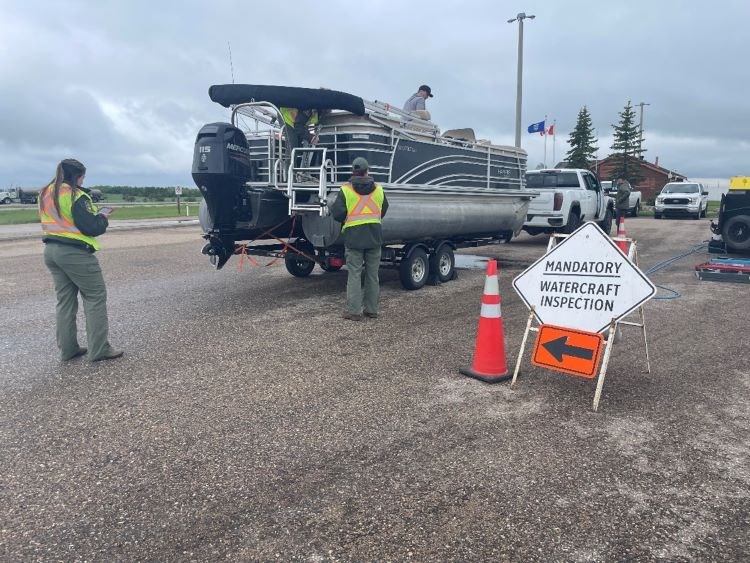Starting next Thursday, Alberta will raise the fines related to aquatic invasive species to become the highest in all of North America.
The fines for failing to stop with a trailered boat at an open inspection station will jump from $324 to $4,200. For those that fail to remove a bilge plug when transporting a watercraft on a roadway, the fines will rise from $180 to $600.
“Zebra mussels and other invasive species can devastate Alberta’s rivers, lakes and waterways,” said Minister of Environment and Protected Areas Rebecca Schulz in a Wednesday news release.
“We are setting the highest fines in North America because we want everyone to take inspection and detection seriously. Alberta is currently zebra and quagga mussel free so let’s keep’em out.”
The stringent measures are meant to help ensure that zebra mussels and other aquatic invasive species stay out of Alberta’s waters.
Currently, Alberta is zebra and quagga mussel free, but they can easily spread through boats and other watercraft that cross borders. If they become established in Alberta, then aquatic invasive species can spread rapidly and cause damage every step of the way. They clog waterways and infrastructure, harm ecosystems and cause hundreds of millions in damages to lakes, waterways and irrigation infrastructure.
There have not been any reports of aquatic invasive species in Jasper National Park. This year, the local aquatic invasive species prevention program will bring in additional measures to better protect the waters of Jasper National Park. There will be a main inspection station located on the Maligne Lake Road plus an additional station located at Whistlers Campground.
The roving public education team will also have an increased presence at area water bodies throughout the park, educating and talking with visitors about the importance of the “clean, drain, dry” proactive steps.
Parks Canada, however, recently closed all bodies of water in British Columbia's Kootenay and Yoho national parks and restricted watercraft in Waterton Lakes National Park to slow the spread of invasive species.
Whirling Disease was discovered in Banff National Park several years ago, and it has also spread to Yoho and Kootenay National Parks in British Columbia.
Around the country and the continent, reports of aquatic invasive species are increasing.
The province stated that it must do everything that it can to prevent damage from aquatic invasive species. A recent study estimated that introducing invasive mussels into just Lake McGregor southeast of Calgary could cost $284 million a year in damages. That water body is part of a larger interconnected system that includes reservoirs and irrigation infrastructure in southern Alberta.
All it takes is just one boat with one zebra mussel to start the chain of destruction. So far, inspections have been successful.
“Every year, boat inspection stations identify several boats entering Alberta contaminated with invasive mussels,” said Megan Evans, executive director of the Alberta Invasive Species Council, in the news release.
“Increasing fines for failing to stop with a trailered boat at an inspection station will help ensure that all boats coming into Alberta are inspected and mussel-free. Prevention is the most effective way to prevent mussels from establishing and destructively impacting Alberta’s waterbodies.”
The only way to stop the spread is to follow the “clean, drain, dry” routine: make sure that your watercraft is dry for at least 48 hours (or at least 30 days after use in the United States or provinces other than British Columbia, Alberta and the territories). This is because some aquatic invasive species (such as zebra and quagga mussels) can survive for nearly 30 days out of water.
The Alberta government has also launched a new Aquatic Invasive Species Task Force and invested $2.5 million to increase the number of inspection stations, add more inspectors, and keep stations open as long as possible.
Aquatic Invasive Species Task Force chair Grant Hunter reminded everyone that watercraft inspections have been mandatory in Alberta since 2015, and that fines are in place to help ensure that boaters follow the rules.
Last year alone, the province inspected 8,818 boats. Of those, 19 were confirmed positive for invasive mussels and two of them came into Canada from the United States. Final destinations of those 19 included seven stops in Alberta.
“The best way to prevent invasive species from getting established is for all people coming into the province to do their part by making sure their drain plug is removed and stopping at inspection stations,” said Grant Hunter, chair of the Invasive Species Task Force and MLA for Taber-Warner, in the news release.
The government has also launched a new Aquatic Invasive Species Task Force and invested $2.5 million to increase the number of inspection stations, add more inspectors, and keep stations open as long as possible.



